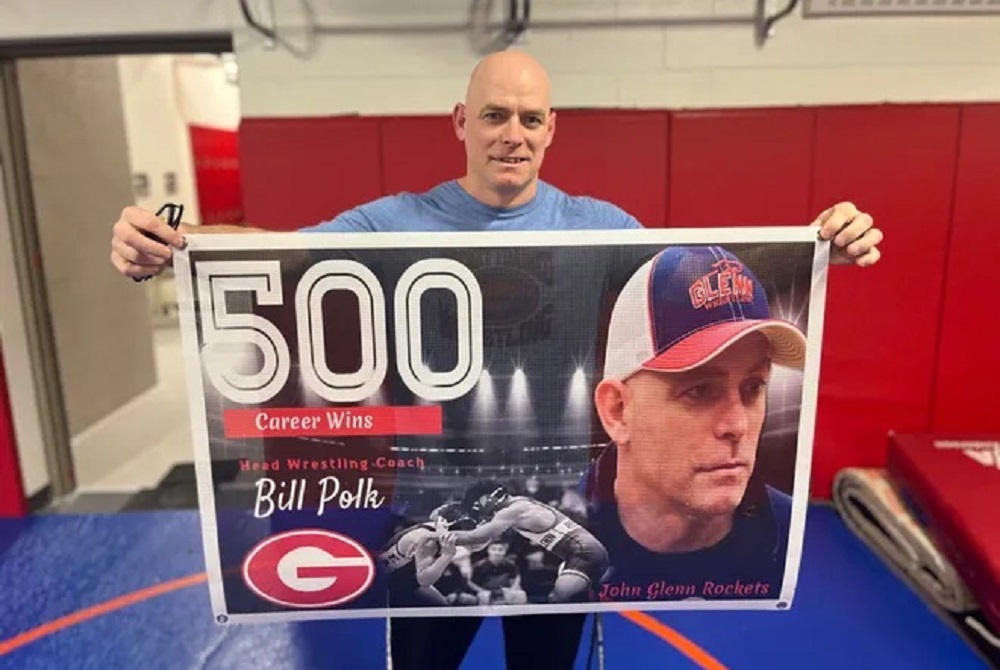
Westland John Glenn's Polk Passes 500 Coaching Wins, Looks Forward to Future
By
Doug Donnelly
Special for MHSAA.com
February 21, 2023
If you can’t beat them, join them.
 When Bill Polk was a high school wrestler at Dearborn High School, he lost his last match – at the MHSAA Finals – to a wrestler from Westland John Glenn.
When Bill Polk was a high school wrestler at Dearborn High School, he lost his last match – at the MHSAA Finals – to a wrestler from Westland John Glenn.
Now, 30 years later, Polk is racking up wins on behalf of John Glenn as the Rockets’ varsity wrestling coach. Earlier this season, Polk collected career victory No. 500 and sees no end in sight for his ultra-successful wrestling career.
“I still have the passion,” said Polk. “About 15 minutes after we lost in the Regionals, I was meeting with our assistants and talking about camps and jotting down our lineup for 2023-24.”
Polk has been a fixture at John Glenn since graduating from Olivet College and landing a teaching job with the Westland district. Wrestling played a role in that as well.
“The head coach that was leaving contacted me and asked if I would be willing to come in,” Polk said. “We got into a conversation about it, and I talked him into staying a little longer and helping me out. It was nice he stuck around for two years and gave me the reigns.”
His first season as head coach at John Glenn was 2000-01, when the team went a modest 9-6. The Rockets won 17 matches both of the next two winters and 27 in 2003-04.
“I thought I would be winning state titles in a couple of years,” Polk said. “I had no clue of the intricacies it took to do such a thing. It’s been a good journey.”
John Glenn has made five trips to the MHSAA Team Finals, reaching the final four once.
And, Polk added, “there have been about a dozen times where we were one match away.”
He’s done a masterful job of putting together a great foundation at John Glenn.
“It’s not easy. It took 10 years before we had our first final eight appearance. There’s a lot that goes into building a program – changing the culture, building a youth program, getting everything set in the summer. It took some time for all of that and to get buy-in.”
The sport has changed dramatically during his 25 years of coaching, from the year-round training to the tremendous impact that youth wrestling has had on the sport across the state.
“Wrestling has changed so much since then,” he said. “About 20 years ago, you took a few kids to camp and had some summer open mats. Now, the kids are coming into ninth grade ready to wrestle. It’s phenomenal. Our youth program has 90 kids involved. I couldn’t imagine that 20 years ago. What youth wrestling has grown into is absolutely crazy.”
Polk has always welcomed his former wrestlers back to contribute to the program, from youth to junior high to the varsity level. In fact, nearly all of the assistant coaches and youth coaches wrestled for him.
“The group I have now, for the most part, all wrestled for me, were super successful, are young guys and they know the system,” Polk said. “I’m there and part of it, but I’m more or less invisible now. They know what they are doing and are super passionate about it and do an outstanding job. I’m very fortunate with that.”
John Glenn won its 18th District title this year under Polk but lost 36-27 to Temperance Bedford in a Division 1 Regional Semifinal. The Rockets and Mules seem to run into each other every year, and there have been some great state tournament battles.
One of Polk’s signature dual meet wins was against the Mules.
“The first year we finally beat Bedford was huge,” Polk said. “That was a big one. That was the 2008-09 season. That was a statement that we made it and our team was known as a competitive team. The best part about that is we’ve been able to maintain that and stay near the top. We really haven’t had a lot of down years from there.”
At first, Polk’s 500th career win came and went without anyone noticing. He saw a local newspaper report about a coach that had won match No. 400, and his assistant coaches began asking how many wins he had. That was about 14 wins after No. 500, which came Dec. 14 against Dearborn Edsel Ford.
“I told those guys not to say anything and, of course, they made a big deal out of it,” he said. “It’s nice. It’s a good milestone to hit. I just didn’t want it to distract from the task at hand. I kind of feel like a small-town celebrity now. The community was pretty excited about it.”
His 2021-22 team won 32 matches, as did his 2009-10 team. This year’s squad went 29-6.
His record now stands at 522-145.
It’s fitting that he has won so many dual meets, because dual meets are one of his favorite parts about the sport. Twenty or so years ago, dual meets made up only a fraction of the season, but today they are a big part.
“It’s my favorite part – the research that goes into trying to bump guys around to win those big meets,” he said. “It’s a chess match. It’s part of what makes it fun.”
The atmosphere surrounding a big dual meet or quad, he said, can be electric.
“You can’t substitute that environment,” he said. “The team aspect is my favorite. Everyone is involved, from your all-staters to your first-year ninth graders. They can all be there and be part of it, not just four or five guys.”
Polk has coached six Individual Finals champions and nearly 90 placers as well.
As a college wrestler, Polk qualified for the nationals three times at Olivet and was team captain his senior season. It was sometime during his junior year that he realized he wanted to remain with the sport after college.
“I just started thinking I wanted to be involved,” he said. “I didn’t know it at the time or what, but coaching was something that started interesting me. I hadn’t been involved in the sport for very long at that time. I wasn’t a youth wrestler or anything. I’m still very passionate about it.”
Polk just turned 49. He has no plans to step away from coaching anytime soon.
“I love it. I’m fortunate to be in a good place surrounded with good people. I’m still having fun. I still really enjoy it,” he said. “I’m going to keep going. I don’t know if I will be one of those guys who are in it 40-50 years, but I’m going to go for a while.”
 Doug Donnelly has served as a sports and news reporter and city editor over 25 years, writing for the Daily Chief-Union in Upper Sandusky, Ohio from 1992-1995, the Monroe Evening News from 1995-2012 and the Adrian Daily Telegram since 2013. He's also written a book on high school basketball in Monroe County and compiles record books for various schools in southeast Michigan. E-mail him at [email protected] with story ideas for Jackson, Washtenaw, Hillsdale, Lenawee and Monroe counties.
Doug Donnelly has served as a sports and news reporter and city editor over 25 years, writing for the Daily Chief-Union in Upper Sandusky, Ohio from 1992-1995, the Monroe Evening News from 1995-2012 and the Adrian Daily Telegram since 2013. He's also written a book on high school basketball in Monroe County and compiles record books for various schools in southeast Michigan. E-mail him at [email protected] with story ideas for Jackson, Washtenaw, Hillsdale, Lenawee and Monroe counties.
PHOTO Westland John Glenn coach Bill Polk holds up a banner honoring his 500th victory. (Photo courtesy of the Westland John Glenn athletic department.)
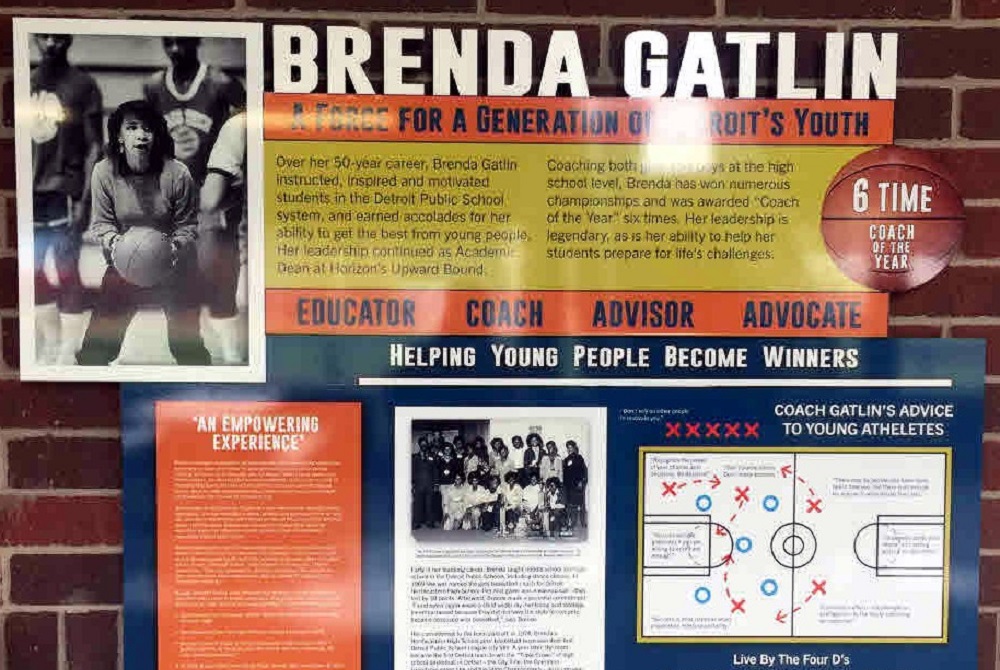
The 6 Ds of Brenda Gatlin - Master of the Coaching Dance
By
Ron Pesch
MHSAA historian
September 30, 2021
She is remembered fondly as one of the greatest to ever coach in the Detroit Public School League and the State of Michigan, yet you won’t see Brenda Gatlin’s name among the leaders in all-time basketball victories. A search of the MHSAA List of Girls Basketball Champions displays her name only once.
You will, however, find Gatlin’s name in one most unexpected, yet fitting place.
The Corner Ballpark, the redevelopment of the site of historic Tiger Stadium – located at Michigan and Trumbull in Detroit’s Corktown neighborhood – includes the Hank Greenberg Walk of Heroes. Opened in 2019, the “exhibit features 12 stories of Michigan citizens who displayed character, innovation and trailblazing spirit in the sports field and the community at large.”
The Corner tribute, as one might expect, includes Tigers greats Greenberg, Hank Aguirre, and Willie Horton. Norman ‘Turkey’ Stearns, a baseball Hall of Fame member and legend with the Detroit Stars of the Negro League is another honoree.
Mixed in with the other eight is Gatlin. The honor is most deserved.
Champion in Life
Gatlin never expected to coach basketball.
“I was a dance teacher,” she told The Southeastern Jungaleer, a public forum for the students and community of Southeastern High School published in the Detroit Free Press in 2009 at the time of her retirement after 43 years in public education. “Early in my teaching career I was asked to coach. I knew nothing about basketball.”
The daughter of a gifted clarinetist, who taught at Lincoln University then left for Virginia State College (VSC) where he became the Head of the Music Department, Gatlin was born in Jefferson City, Mo., to Dr. F Nathaniel Gatlin and his bride, Mildred Pettiford Gatlin, an elementary education teacher and reading specialist. The family moved to Petersburg, Va., when her father accepted a position at VSC. Brenda graduated from segregated Peabody High School – the earliest publicly-funded high school for African Americans in Virginia.
“Dad was strict and no nonsense – mom, nurturing and loving,” Gatlin recently recalled of her parents. “Dad was loving also, but his life was filled with so many trials and tribulations. It would take too much time to explain. He graduated from Oberlin Conservative College of Music, Northwestern University (master’s), and Columbia University (doctorate). Mom graduated from Lincoln University (bachelor’s) and VSC (master’s).
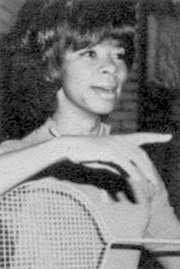 “I, of course, did not want to attend Virginia State because I grew up on the campus. My dad insisted, ‘If it is good enough for me to work here, it is good enough for you to attend.’ I started out as an English major my freshman year and changed to health and physical education with a focus on dance. They did not have a choice of dance as a major.”
“I, of course, did not want to attend Virginia State because I grew up on the campus. My dad insisted, ‘If it is good enough for me to work here, it is good enough for you to attend.’ I started out as an English major my freshman year and changed to health and physical education with a focus on dance. They did not have a choice of dance as a major.”
Brenda began teaching in Detroit at Barbour Middle School in 1966: “I started my tenure with Detroit Public Schools immediately upon graduating.”
“When I came to Detroit, I only planned to stay here three years. But I fell in love with the city,” she told the Free Press in 1976.
Her next career move was to Detroit Northeastern for the 1969-70 school year.
“I went to the Office of Human Resources and they had an opening at Northeastern high school for a Health and Physical Education and Dance Teacher. All of my classes were dance. I was elated. … My love was always Ballet, and Modern Dance,” she said. “At one of our department meetings, Norm Morris, Department Head, said we need a girls’ basketball coach.”
Both programs were long-established athletic department activities with histories that dated back decades at the school, once located on Detroit’s Lower East Side.
“I was in the midst of creating a choreography for the ALL-City Dance Concert that had been scheduled. Mr. Morris knocked me for a loop and said, Ms. Gatlin, you will coach the girls’ basketball team …” she recalled.
“I never in my wildest dreams ever thought that I would have to coach any sports, especially girls basketball.”
Making of a Coach
As a health and physical education major, Gatlin had played some intramurals and learned about sports mechanics, policies and procedures, and rules and regulations while in college.
“I was familiar with the 6-player rule, but the year I started coaching, the rules for girls had changed from 6-on-6 with a roving player to 5-on-5 with unlimited dribbling” she said. “Well needless to say, I choreographed my plays; I knew about movement. I studied the game as much as possible, but my focus was on dance.
“(I)n our first two seasons, we played only five games (each season),” she said to the Free Press, remembering those days when the girls played only against other Detroit city schools.
“The home team (supplied) oranges at half time, and cookies and milk for a social after the game,” she said recently, describing a completely different era. “You can imagine those girls scrapping and running down the court and then having to sit with the opposing team at the end for a social.”
In 2002, she recalled her opening contest as a coach for Lorne Plant at State Champs: “(Our opponent) proceeded to beat us by about 30 points.”
That game was a turning point.
“When we hosted Central high school, under the coaching jurisdiction of Doris Jones, everything changed. … I greeted Coach Jones. Without a greeting, she immediately said, ‘Where is the gym?’ I knew we were in big trouble.
“Sitting there watching my choreographed plays and movements … watching the determination on the faces of my girls – who looked over to me for answers, which I had none, watching my girls continue to fight and battle, even though they were down by 30 points, changed my life and focus. They just didn’t have the skills to compete. I vowed at that moment, ‘no students under my tutelage would be demoralized or embarrassed because they did not, at least, have the skills to compete.’ That game did it, and I owe it all to Coach Doris Jones. I rolled-up my sleeves and got to work.”
Title IX
The advent of Title IX meant things were changing in girls athletics all over the country.
“I remember attending myriad meetings at Wigle Recreation Center with other Detroit female physical education teachers. (At that time, women were the only ones allowed to coach girls in athletics in Michigan). The purpose of the meeting was to discuss whether girls should adopt the same 10 game schedule as the boys,” she said. “Some of the older coaches, and teachers had comments like: ‘This will be too difficult on the female body … studies show that the female uterus will drop if girls are allowed to run up and down the court for any length of time.’ We had to sit and listen to comments such as that. However, we voted that girls should be provided the same opportunities as boys. I suppose Christine Whitehead, Assistant Director of Athletics, provided Dr. Robert Luby (director of the Department of Health, Physical Education, and Safety for Detroit Public Schools from 1962 to 1983) with our sentiments. With Title IX it was a given. Some people still fought it.”
“Subsequent to the fiasco with Central, I had commenced the process of enhancing my knowledge of the rules and skills inherent in the game of basketball defensively and offensively. I discovered (UCLA coach) John Wooden’s books. His books became sort of my ‘Basketball Bibles.’ I became obsessed with the game. I woke up with basketball, went to sleep with basketball.
“And further, the recreation centers were sending us players who had some experience with the game. The Catholic Schools had a feeder program. We did not. So, my hat goes off to Virginia Lawrence and her sister Evalena, Coach Curtis Green, and many others who taught girls at an early age the skills of basketball.”
With the arrival of the federal law, the MHSAA sponsored its first girls basketball tournament in the fall of 1973. Gatlin’s Falconettes were ready.
Led by Hazel Gibson and the talented Williams sisters (Annette, Helen, and Shelia), they were now among the top teams in Detroit.
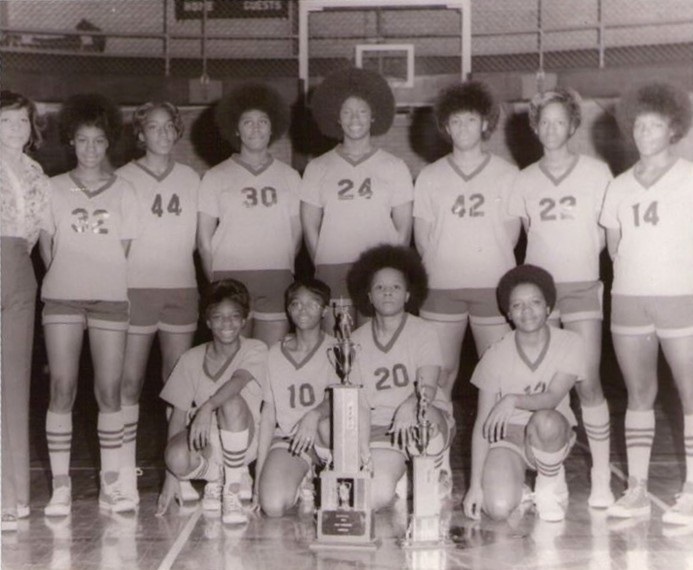 The team advanced to the Class A Regional Finals, falling to eventual state champ Detroit Dominican. All-city selection Sheila Williams, a sophomore, scored 26 points and pulled down 26 rebounds to lead the Falconettes.
The team advanced to the Class A Regional Finals, falling to eventual state champ Detroit Dominican. All-city selection Sheila Williams, a sophomore, scored 26 points and pulled down 26 rebounds to lead the Falconettes.
In 1974, Northeastern trounced Murray-Wright, 73-27, winning its first Public School League (PSL) regular-season tournament before 500 fans at Wayne State University’s Matthaei Building. Gatlin’s team again ran into Dominican in the MHSAA Tournament, this time in a District Final. The Williams sisters combined for 61 of the Falconettes’ 71 points but fell 74-71 in a foul-filled game.
The defeat was Northeastern’s only loss in 16 games. Senior Lynn Chadwick posted a career-high 28 points to lead Dominican, which would repeat as Class A champ.
“Girls will play their heart out for you,” Gatlin told the Free Press following the season, “if they believe in you and if you treat them fairly.”
Postseason reward came in 1975 when Northeastern topped Dominican in the MHSAA Semifinals, 75-69, then defeated Farmington Our Lady of Mercy, 67-62, to earn the Class A title. Helen Williams scored 31 in the championship game, while Shelia added 20.
“Everybody knows about Shelia and Helen,” Gatlin told the press, “but it was the defense we got from our guards that did the job for us in the second half. We switched from a zone defense to our press and that made the difference.” Northeastern ended the year with a perfect 20-0 record.
Gatlin spent two more seasons at Northeastern before moving on to newly-opened Detroit Renaissance in the fall of 1978.
College Calls
“In 1978, I was asked to teach in a new examination high school,” continued Gatlin, “Renaissance High School (located at Old Catholic Central School). I hesitated because transferring to Renaissance meant no coaching, for Renaissance would not have an athletic program. It would be strictly academic. I enjoyed the fact that I was a part of the planning process in developing plans for the opening of a new school. The whole Renaissance situation was controversial, because many thought Cass (Tech) was enough. The rest is history. Our students were only able to participate in an intramural program, and I taught dance.”
There, she received a call from the athletic director at University of Michigan-Dearborn. Roy Allen, the associate director of health and education for the Detroit Public Schools, had passed on her name as a possible candidate to lead Michigan-Dearborn’s girls basketball team.
“I was able to juggle my teaching responsibilities at Renaissance with my coaching responsibilities at Michigan-Dearborn,” she said. But balancing the coaching duties would become more challenging as time moved on.
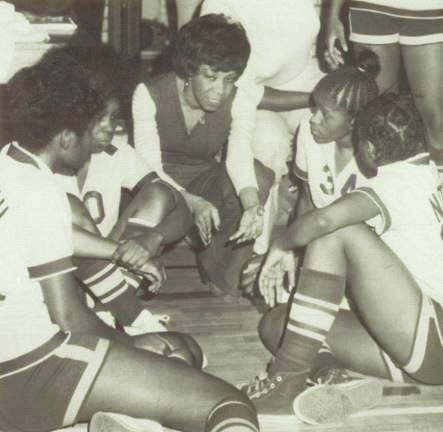 “It became even more difficult as the distances of scheduled games became further and further. We were only provided a van that my Assistant Coach and I had to drive. Returning so late and trying not to short-change my students at Renaissance became even more difficult.”
“It became even more difficult as the distances of scheduled games became further and further. We were only provided a van that my Assistant Coach and I had to drive. Returning so late and trying not to short-change my students at Renaissance became even more difficult.”
Return to the PSL
“In 1981, Dr. Remus, the first principal of Renaissance who convinced me to transfer from Northeastern, was asked to become the principal of Cass Tech. Cass was experiencing some issues that they felt Dr. Remus could clear up,” Gatlin said. “Shirley Burke, the successful girls basketball coach at Cass, was stepping down. Cass also needed a dance teacher. Therefore, Dr. Remus said, ‘Ms. Gatlin, I need you at Cass.’ I think I was ready to get back to the high school level. I learned so much more coaching on the collegiate level and had grown extensively. Coach Burke left me with great players.”
When a teacher’s strike in the fall of 1982 threatened the Lady Technicians’ basketball season, Gatlin and her players petitioned Detroit school superintendent Dr. Arthur Jefferson for equal treatment that was afforded the Detroit PSL prep football teams.
“Coaching staffs at Detroit’s 21 high schools have volunteered to continue the football program after hours despite a three-week-old strike,” wrote Joyce Walker-Tyson in the Free Press. “Schools must play a certain number of games to be eligible for tournaments. While there is no similar requirement for girls’ basketball, Title IX … calls for equality in boys’ and girls’ athletics.
“During the teachers’ strike, (the girls were) the ones who went down to talk to the board (of education) all by themselves,” Gatlin told the Free Press’s Mick McCabe
When all 21 of the girls high school coaches volunteered their services, the girls season was saved, although it started late.
Her 1982 team upset No. 2-ranked Trenton in the Regional Final before advancing to the Class A Quarterfinals and falling to Farmington Mercy 38-34 in a thriller.
The season marked the first of three straight PSL championships won by Gatlin’s teams. At Cass Tech she developed a number of all-city and all-state players, including Pamela Dubose (Iowa/Wayne State), Kendra McDonald (Western Michigan), Nikita Lowry (Ohio State), Adrianne Smiley (Ball State), Clarissa Merritt (Ferris State), Sonya Watkins (Houston) – whose father Tommy had been a running back for the Detroit Lions from 1962-67 – Wendy Mingo, Savarior Moss, Yvette Walters, and others.

Expanded Responsibilities, Greater Influence
In the fall of the 1984-85 school year, Gatlin was asked to also coach Cass Tech’s boys team.
“I looked at my staff and hired the best possible person,” said Jeannette Wheatley, Detroit Cass Tech principal in September 1984. “Brenda is an excellent teacher, and she is a marvelous motivator.”
“I see it as a challenge for all female coaches,” Gatlin said to McCabe after the announcement. “But the men have been doing a dual role for years. The Xs and Os are Xs and Os. Basketball is basketball. Outside the strength factor, it’s the same game.”
Gatlin at Cass Tech, Kathy Curtis at Colon, and Carol Brooks at Burr Oak were all in charge of boys varsity teams that winter. They are believed to be the first to do so in Michigan.
She took the job for a year, but delayed her start. The beginning of the boys schedule in 1984 overlapped the girls postseason. (Prior to the 2007-08 school year, girls basketball was played in the fall in Michigan.) Gatlin didn’t want to shortchange her girls.
The Lady Technicians finished with 22 wins against 4 losses that season, advancing to the Class A Semifinals before falling to eventual champion Flint Northwestern. So it was mid-December before she returned to the boys team for the fourth game of the season, a 60-58 win. A young team, Cass Tech finished 10-9 on the year.
Back in 1974, Gatlin told Hal Schram of the Free Press that she wasn’t sure she wanted to spend the rest of her life coaching basketball.
“You have to be a psychologist, a coach and a sociologist to get the complete job done,” she said.
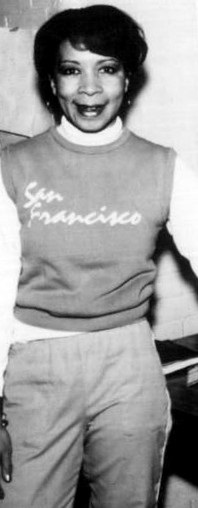 She continued coaching the girls at Cass Tech in the fall of 1985. Then an opportunity came in 1986 to move into administration and serve as athletic director at Detroit Southwestern. She took the job, as it offered an opportunity to make impact on a larger scale. There, she also taught modern dance.
She continued coaching the girls at Cass Tech in the fall of 1985. Then an opportunity came in 1986 to move into administration and serve as athletic director at Detroit Southwestern. She took the job, as it offered an opportunity to make impact on a larger scale. There, she also taught modern dance.
In 1992, she moved back to Cass Tech, now as an assistant principal. She became principal at Southeastern in 1999, where she stayed until her retirement.
Determination
Today, she continues to practice her belief in the potential of the human being, working with Cranbrook schools and their Horizons-Upward Bound Program as academic dean. There, she helps students from the Detroit metropolitan area who have limited opportunities to enter and succeed in college.
Her life has always been built around four Ds.
“I still use it even with my students in the Cranbrook Horizons-Upward Bound Program,” she said. “When I use the Ds with Basketball, it becomes five Ds: Determination, Dedication, Desire, Discipline, and Defense.
“My players knew that defense wins games; it’s the name of the game. Offense is for the spectators. Defense is for the win. Our chant in our huddle always ended with, ‘The name of the game?’ They would respond with ‘Defense!’ This would be recited several times in the huddle prior to them taking the floor. My players knew that the most important ‘D’ other than defense is discipline.
“... I may have adopted it from my dad. I also used his quote, ‘The difference between resting on the bench and rusting on the bench is u.’ There were a few others.
“You can be dedicated, you can have the determination and the desire, but if you don’t have the discipline, success may not happen.”
The Sixth ‘D’ - Drive
“I get my determination and drive from my dad. My mom was very mild mannered. They were an awesome couple and a great parental balance for my brother Nat and me,” she said, and that drive – the need to teach – remains strong.
“I can’t stop.”
 Ron Pesch has taken an active role in researching the history of MHSAA events since 1985 and began writing for MHSAA Finals programs in 1986, adding additional features and "flashbacks" in 1992. He inherited the title of MHSAA historian from the late Dick Kishpaugh following the 1993-94 school year, and resides in Muskegon. Contact him at [email protected] with ideas for historical articles.
Ron Pesch has taken an active role in researching the history of MHSAA events since 1985 and began writing for MHSAA Finals programs in 1986, adding additional features and "flashbacks" in 1992. He inherited the title of MHSAA historian from the late Dick Kishpaugh following the 1993-94 school year, and resides in Muskegon. Contact him at [email protected] with ideas for historical articles.
PHOTOS (Top) Brenda Gatlin is among honorees at Detroit’s “Walk of Heroes” display. (2) Gatlin’s first high school position was at Detroit Northeastern, here in 1971. (3) The 1974 Falconettes pose with their first Public School League trophy. (4) Gatlin huddles with the team in 1976. (5) The 1983 Cass Tech team: (Kneeling, left to right) Kim Justice, Ursula Gordon, Andrea Shaw and LaTrece Owens. (Standing, left to right) Coach Brenda Gatlin, Adrienne Smiley, Clarissa Merritt, Wendy Mingo, Kendra McDonald, Nikita Lowry, Kim Wells and Kathy Scates. (6) Gatlin left Cass Tech in 1986 to become athletic director at Detroit Southwestern. (Photos gathered by Ron Pesch from multiple school yearbooks.)

